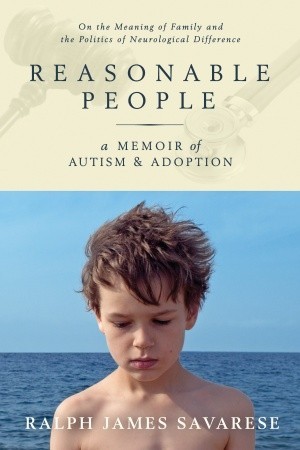
Reasonable People:
A Memoir of Autism
and Adoption
by Ralph James Savarese
Other Press, 2007
Reviewed by Barbara Free
DJ’s adoptive father is a writer and professor of literature and creative writing at Grinnell College in lowa. His adoptive mother, Emily, is an educator and advocate for inclusion of persons with disabilities, particularly advocating for their inclusion in regular classrooms, not placed in special education classes or separate schools. Before DJ came into their lives, she was already an expert about autism and about trauma. Their lives, however, were completely changed by the life experience of meeting this child, trying to work with the foster and legal systems in Florida, trying their best to work with his birth parents and birth father’s subsequent wife, trying to have an open adoption for the sake of DJ and his sister, and by the very complicated and difficult, though rewarding, experience of loving, raising, and educating DJ. They had previously thought they did not want children, but came to believe that DJ was the best thing that ever happened to them.
This little boy had been neglected and abused by his birth mother, a traumatized person herself and alcoholic/addict who never found recovery, in spite of numerous periods of in-patient treatment. She ultimately lost six children to the foster-care system. DJ’s birth father left when DJ was a toddler and his sister was just a year older. He was HIV+, and the foster system knew that, yet made no effort to have DJ or his sister tested. Later, he took full custody of DJ’s sister, Ellie, after marrying a woman who was also HIV+. They had met at an HIV support group. Neither was symptomatic. The new wife wanted nothing to do with DJ, but wanted the sister to become her “own” daughter, more or less as a project, putting her in a private school, demanding perfect behavior, many outside activities and lessons, and wanting complete loyalty to her from the child. She was relatively affluent and from a well-to-do family, while Dan (DJ’s and Ellie’s father) was, in his own words, “an unemployed former drug user,” which sounds like a very odd match. The HIV status of both would seem to be the main thing they had in common; that, and not wanting DJ.
While in foster care, between repeated attempts to place him back with his birth mother, DJ was severely abused by an older foster child, the extent of which was not known to anyone else until much later, after DJ learned to type by means of what is called “facilitated communication,” where someone physically helps the person type on a text-to-voice synthesizer. This is a controversial subject among some therapists and educators. However, DJ did gradually move to independent typing, and some limited sign language.
Ralph and Emily Savarese had DJ for respite care at first, then as a foster child, and finally were able to legally adopt him about the time he started kindergarten. The book details their long struggle to accept that his birth mother was never going to be able to parent DJ, and their extreme advocacy for his inclusion in a regular classroom, which involved aides and an unbelievable amount of patience and persistence on everyone’s part. DJ was not only non-verbal, and thought by some to be severely intellectually disabled, he was often quite violent and dangerous. The Savareses were very fortunate to have moved to Grinnell, IA, where the school strongly supported their efforts. Many school districts would have refused to allow DJ to attend after his first violent outburst.
In time, DJ was, by means of his typing, able to tell his adoptive parents and his therapists what had happened to him in the past, as well as to communicate his thoughts and feelings. He was, in fact, highly intelligent, perceptive, creative, and very sensitive to everything around him. It is not possible to separate the issues of adoption, abuse and trauma, autism and treatment in this story. It is extremely detailed, sometimes more than the reader may want, but without the details, it would be extremely difficult to understand DJ’s situation and his parents’ overwhelming love for him. Their courage, not only in being his parents, but in continuing to advocate for him at all times, while maintaining their own careers, is remarkable. In addition, Ralph Savarese has a progressive physical disability himself. Few people, no matter much they love their children, could do what they have done.
This book is not for the casual reader nor for those who want easy, happy endings. It calls into question every belief and policy one might have about foster care, open adoption, disabilities, trauma, therapy, and education, yet it remains an optimistic and inspiring story. For those with deep interests in adoption and/or disabilities, particularly autism, this is an amazing book. Although published in 2007, it is still very relevant. At the end, after the last chapter, written by DJ himself, one might wonder what has happened in the ten years since. He was in middle school then and is now a grown young man. In fact, by consulting Google and Facebook, I discovered that DJ now types independently on his text-to-voice synthesizer; that he attended Oberlin College, in Oberlin, Ohio, where he now lives; and that he has written and produced a documentary, Deej, which will be released in October. You can see a two-and-a-half-minute trailer for the film at www.deejmovie.com.
Thanks to the kind donation by Marilyn Roy, of Topeka, KS, a copy of the book Reasonable People is available in the O.I. Lending Library. The book is also available on Amazon.
Excerpted from the October 2017 edition of the Operation Identity Newsletter
© 2017 Operation Identity